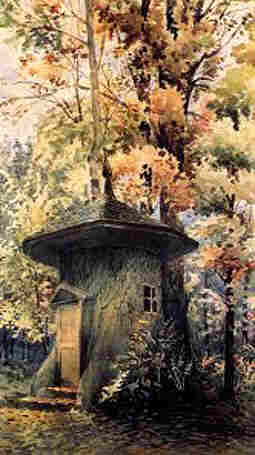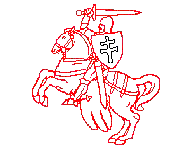
Poška's Baublys,
Lietuva
>>>|||<<<

"Iz līkutan spankstin debīkan panu."
| Dionizas
Poška (1757-1830), writer, poet, scholar, was born in Barzdžiai, on
April 30, 1757. The place and time of his birth are not firmly
established. He came from a family of local nobles and maintained
life-long residence on his small estate at Barzdžiai- Bijotai commuting
when necessary to Raseiniai, where he intermittently served as court
clerk and notary public. He studied at the College of Kražiai but did
not graduate, rather, furthered his education on his own by reading and
befriending scholars from the University of Vilnius. He himself
undertook to excavate barrow graves and to collect archaeological,
numismatic, and ethnographic evidence. Out of an Oak trunk he created a
small museum named Baublys. It had the fitting, yet humble,
distinction of being the first Lithuanian museum. This museum soon
became widely known and played an important role in encouraging people
to cherish and study the past of their country. Baublys has remained up
to our days. He maintained an intensive correspondence with professors at the University of Vilnius (Lelewel, Onacewicz, Lobojko), educational officials (Czacki), linguists (Koeppen), translators (Bishop Juozas A.Giedraitis) and others. Poška’s principal concerns was to include someone competent to write a comprehensive Lithuanian history. Poška himself collected historical evidence, using his findings and those of other authors for writing Polish and Lithuanian tracts, versified, on one or another aspect of the Lithuanian heritage. He published a booklet "Rozmyslania wiesniaka rolnika" (Contemplation’s of a Peasant Agriculturist, 1829), wrote essays on Samogitian barrow graves, ancient burial customs, native pre-christian religious ceremonies, village domiciles, and other topics. Poška was also very concerned with the state of the Lithuanian language. One of his most important undertakings in this area was the preparation of a Polish-Latin- Lithuanian Dictionary, whose manuscript remains at the Academy of Science Library in Vilnius, Lithuania. The most significant part of this dictionary is its phraseology and literary illustration of the usage of words. In addition, he wrote many original poems and translated poems of others', versified aphorisms, epigrams, and satirical sayings. His largest and most well-known work is "MUŽIKAS ŽEMAIČIŲ IR LIETUVOS" (The Peasant of Samogitia and Lithuania), written between 1815-20. Its content is suffused with a specifically Lithuanian perspective, articulating the oppression of the Lithuanian serf and revealing the author’s sincere empathy with him. "The Peasant of Samogitia and Lithuania" is also significant in the history of Lithuanian literature for its artistic expression that shows in the vividness of images and similes, the colorful popular language, and fluency of verses. In addition, 16 longer poems and about 300 short Lithuanian poems by Poška have survived; many other have been lost. His collected poetry, letters, and essays have been published as "Raštai" (Writings) in Vilnius in 1959. |



Use the "Back" button to return
________________________
or, Click Here to visit
"Virdainas - a Sūdovian Dictionary"
if you haven't yet